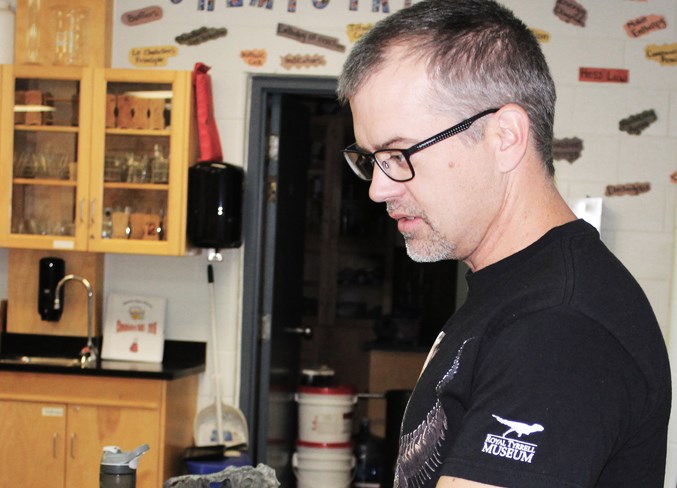Once in a while science teacher Jeff Johnson is confronted by students about the prehistoric creatures from Hollywood's Jurassic Park film series, whether those will be studied and even uncovered as part of the course curriculum.
Yes, he says, but they really don't speak to the truth of the mysteries they aim to solve.
"But we do discuss it once in a while," said Johnson with a chuckle. "Because we learn stuff. A lot of stuff in Jurassic Park is out of date and not accurate."
Johnson, who is one of the few high school teachers of palaeontology in the province, can easily be described as an expert instructor in that field, which is described as the study of fossils to determine organisms' evolution and interactions with each other and their environments. He has been teaching it for the past four years at Spruce View School and before that for five years in Coronation.
His classes have become so popular since his arrival in Spruce View it has been expanded by the Chinook's Edge School Division in a pilot program to serve 14 students simultaneously at four different Chinook’s Edge schools, including those in Delburne, Bowden and Cremona.
"There are a lot of students in the division that have an interest but we were the only school teaching it," said Johnson. "I have a camera and use Google Hangouts and have classes from Delburne, Bowden and Cremona joining remotely. Before I just taught it to my own students but the word got out that I was teaching this course, other students were interested and how can we create an opportunity for those kids that have an interest."
Those opportunities include teaching the kids there is so much more to palaeontology than just the giant scary creatures depicted in the Jurassic Park film series.
"Typically when you talk about or mention the word fossil or prehistoric life they think of either dinosaurs or mammoths, right?" said Johnson. "But there are so many other groups of organisms that have gone extinct in the past, like a long list of cool stuff from even before the dinosaurs were around. That really fascinates them."
And unlike an interpretation of archeology that incorrectly suggests that X marks the sport, palaeontology involves more than just a simple dig at any given point, like in the Alberta Badlands where his students go on field trips to get a sense of time and place and a chance to check out the world-renowned Royal Tyrrell Museum of Palaeontology.
"It is a way of investigating the world around you and trying to find answers," he said, adding science is really a way of probing the world and not "just about a bunch of facts. This is a really good course that allows me to revisit that and teach them science and investigation and using dinosaurs to do it, which piques their interest as well.
"The thing I like about it is that it is a good platform to teach science because palaeontology really follows a scientific method, an investigation and solving mysteries, and looking for evidence, and observations," said Johnson. "It is a great way to teach the scientific method, inquiry and investigation."
In the meantime, Johnson has wrapped up his semester of high school palaeontology classes. The inaugural course has been so successful he has already begun planning another unique learning option , ‘Big History,’ for the second semester.
“In the past, these specialized courses were difficult to deliver in remote communities. It’s nice to be able to provide a course that’s not commonly offered," said Johnson. "This is the perfect province to immerse yourself in this topic. Alberta has an amazing museum and a rich history in palaeontology. People come here from all over the world to be around this, and it is a pleasure to bring it alive for our students."



